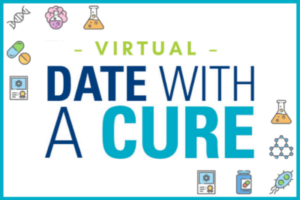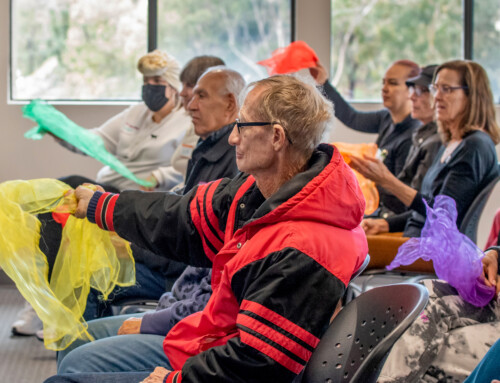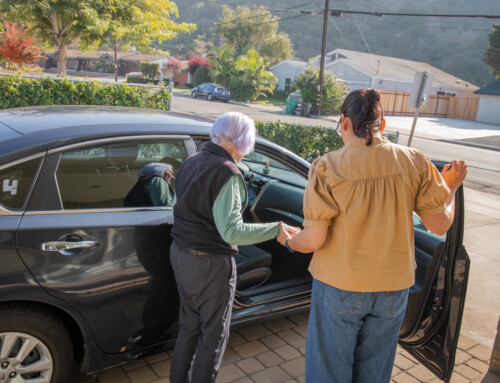By Maddie Shureen
On Tuesday June 14th, we held our annual Date With A Cure research forum with six expert panelists who answered questions and presented recent scientific advancements. Thanks to the panel of scientists, San Diegans were able to ask specific questions and receive answers that will help them navigate Alzheimer’s disease or another dementia. Among other interesting topics, this year’s forum shared exciting research on human cell models, insight on the Alzheimer’s drug Aducanumab, the importance of clinical trials and studies, and much more.
Watch the 2022 research forum below.
Eugenia Welch, President/CEO of Alzheimer’s San Diego, opened up the forum with who we are at Alzheimer’s San Diego. As an independent nonprofit, we help people impacted by dementia, fight stigma, and support local research. Eugenia shared that there are almost 100,000 individuals living in San Diego County who have been diagnosed with a form of dementia. She also added that of these individuals, at least 25,000 are those who live alone with dementia. One of Alzheimer’s San Diego’s new programs, Volunteers in Touch (VITALZ) is a specialty program that directly supports this population.
To update participants on the efforts of Collaboration4Cure, Eugenia shared the amazing 17 research projects with appreciation of their support. She also hopes to see many Date With A Cure participants at the upcoming fundraising events that will continue to raise awareness of local research and bring much-needed help to anyone affected by memory loss. You can read more about the fun events here.
Eugenia then introduced the event’s moderator, Marcella Lee, who has personal ties to Alzheimer’s disease. Marcella is a News Anchor for CBS8/CW San Diego who strives to help the community become more aware of dementia and resources families can rely on. She helped guide questions from participants to the research panelists while monitoring the chat box.
Marcella kicked-off the conversations with a question on all of our minds: What is new in the world of research since last year’s Date With a Cure? The researchers each answered this question and many others. You can read the panelists answers to this opening question, and then some of the forum’s key highlights below with what you can do if you interested in brain health:
Dr. James Brewer, UCSD’s Shiley-Marcos Alzheimer’s Disease Research Center
In response to Marcella’s important question, Dr. Brewer was excited to share more about human model testing to understand the impact of aging on living human beings. Up until recently, this was not possible to do. The science behind this allows researchers to study young and aging neurons to see how aging impacts these neurons in a shorter time period to expedite the process.
Dr. Jerold Chun, Neuroscience Drug Discovery Sanford Burnham Prebys Medical Discovery Institute
Dr. Chun shared his fascination with what scientists are studying at a single cell level to better understand how the hundreds of billions of cells, that’s right billions with a “b,” make up brain changes over time. He says that thanks to local research, there is so much more going on in the brain than we have fully appreciated. With that being said, Dr. Chun feels hopeful that we will be able to better understand the fine details of elements and assess them in human models as Dr. Brewer mentioned.
Dr. Chun along with Dr. Brewer discussed the role of neuroinflammation to point out that there is a high level of complexity with this topic. Neuroinflammation is the way the brain responds to infections, which we see this in situations including Alzheimer’s but it is unclear if this is a good or bad thing. Dr. Chun explained that another part of this may be that new types of relationships are emerging that may be more tied to Alzheimer’s disease. They both expect this to be a hot topic at the next Date With A Cure, so stay tuned!
Dr. Douglas Galasko, UC San Diego
Dr. Galasko, Neurologist & Professor of Neurosciences, answered this question with very exciting research to use blood tests to identify brain pathology in individuals who live with Alzheimer’s disease. This concept has emerged in the past few years and presents the potential to detect different parts of the disease in early stages. He also shared that blood tests may become a way to screen people for clinical trials. While there is not an FDA approved test in this arena, Dr. Galasko is hopeful that it will undergo review in the near future as a way to see more into the brain while providing us accessible tools to use in research then in clinical care in the future.
Dr. Doris Molina-Henry, USC Alzheimer’s Therapeutic Research Institute
Echoing Dr. Galasko, Dr. Molina-Henry shares his excitement in the advent of blood based biomarkers in another respect. She is hopeful that in the future, this research will help to identify people who are at a higher risk through simple blood tests. Dr. Molina-Henry also highlighted the significance of this test in regards to trials and the promotion of participation. She believes that a blood test would offer people who would otherwise not participate in trials a real opportunity to volunteer, with a priority to those affected in minoritized communities. This test would further identify risk of Alzheimer’s disease and promote ease of participation to ultimately develop a cure that works for everyone. The topic of clinical trials is an increasingly important topic that the panelists discuss more in-depth with their talking points found below.
Dr. Michael Plopper, Sharp Clinical Research Center
Dr. Plopper still feels that approval of Aducanumab, a disease modifying agent, is a huge step despite the situation with the FDA. He detailed two more amyloid lowering agents going in front of the FDA in the next year so he continues to echo the points on the plasma biomarkers. Dr. Plopper took a moment to acknowledge the very real caveat to these advancements: Medicare coverage. He does, though, believe this will be a chance to address the important question of how we will pay for treatments that researchers develop in the next few years. The topic of Aducanumab is discussed throughout the forum!
Dr. Sherry Soefje, Excell Research
Dr. Sherry opened her discussion by reinforcing the excitement of the first disease modifying treatment regardless of its controversy. Given the fact that companies continue to spend money looking for ways to help people with Alzheimer’s, Dr. Cherry believes this is creating and continuing momentum we need. Dr. Sherry described this process as a crossword puzzle in the way that the more pieces you put in, the closer you are to finding the answer.
Key Takeaways
Aducanumab
In regards to aducanumab, there are still many questions and challenges to be addressed. Costs, implementation, and safety risks are the main concerns the panelists point out. Dr. Chun believed this to be an opportunity to reevaluate the FDA approval process of drugs. Dr. Galasko mentioned again three more drugs that are in a similar fast track status. Dr. Plopper explained that medications your healthcare network may recommend are not like medications you take for a headache and it goes away, but recommended to try them and stay with them for a significant duration.
Who and when should get tested
Dr. Galasko explained that if you have a family history of the disease, you are not inevitably going to develop it but you may be at a higher risk than if you did not have a family member who was diagnosed. He encouraged anyone concerned about memory loss to learn more about general brain health, regardless of a connection to dementia. He emphasized the importance of a positive lifestyle with exercise, nutrition, sleep, attention to medications, and socialization.
Dr. Galasko, Dr. Plopper, and Dr. Molina Henry also came together in discussion to explain that if you are in your 50’s or 60’s, it might be worth having a discussion with your primary care physician for a preliminary step to see what is available for you. Dr. Galasko explained that not all memory changes turn out to be something progressive. He shared that the “tip of the tongue” phenomenon does not warrant major testing, but if you are concerned, do talk with your primary care physician who can look broader at what else may be happening.
Clinical trials
If you would like more information about yourself beyond speaking with your physician, memory screenings and clinical trials may be good options to receive medical care and attention that you may otherwise not get. For example, clinical trials may provide a pet scan and sophisticated imaging people can get for free along with physical and cognitive testing. Dr. Molina-Henry reiterated these important points with the addition that clinical trials exist for people whose parents live with dementia or who do not experience symptoms but are interested in learning more. For more information on Clinical trials, call 858-492-4400
Dr. Sherry opened the conversation to a deeper issue of underrepresentation of populations within clinical trials. Unfortunately, there are not many clinical trials on vascular dementia because most trials like to focus on one symptom and health concern. Dr. Sherry showcased a tool to look for clinical trials: ClinicalTrials.gov. Dr. Brewer shared Alzheimer’s San Diego’s Clinical Trial Registry is a great place to communicate an interest and become connected with trials or even observational studies. He also encouraged anyone with another dementia to push your interests in trials and studies forward to ensure you are being heard.
Dr. Molina-Henry is currently focusing efforts on outreach to underrepresented groups to increase community reach and partnerships. She is excited to see more inclusivity in trials and studies that support more populations. Work will continue to be done to better support these underrepresented groups in different languages. Dr. Chun further emphasized that understanding many risk factors of Alzheimer’s disease will change with the diversity of participants. Dr. Chun and Dr. Brewer joined the conversation together to also bring attention to the gift of the brain by someone who lived with Alzheimer’s through body donations is a critical part of the entire effort to treat this disease.
Preventions
While Alzheimer’s disease is not reversible, the panelists all emphasized on the more relevant points to focus our energy on that are proven through research such as prevention and early intervention. Studies on lifestyle interventions and non-invasive modulations have great importance, another researcher who found roughly 40% of dementia risk is modifiable based on lifestyle. The panelists agreed that there are elements of a healthy lifestyle to pursue that we can do to intervene and change the course of the disease. A few components of everyday life we can pay more attention to are the following: sleep, stress and anxiety, mental and physical activity, and socialization.
Trials and studies have shown us that caregiving is one of the most stressful jobs out there but it’s unknown if the degree of stress in the days of caregiving are significant over time. Dr. Brewer explained the importance of mitigating stress, highlighting Alzheimer’s San Diego support groups. Dr. Sherry and Dr. Brewer offered some advice for caregivers navigating the disease: Caring for someone is also like a crossword puzzle in that answers fluctuate so it’s a good opportunity to understand what factors change the functioning of people with dementia, such as an unfamiliar environment and medications. Anyone who does not get enough food or sleep generally does not perform at their best level, so this is something to keep in mind!






